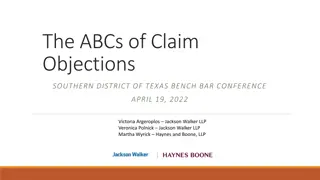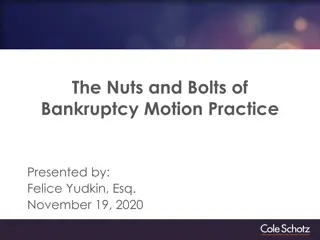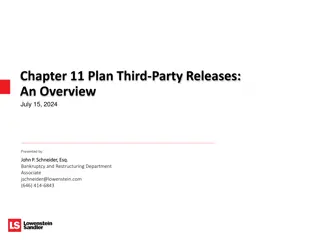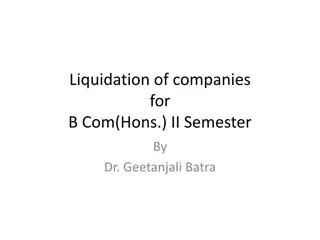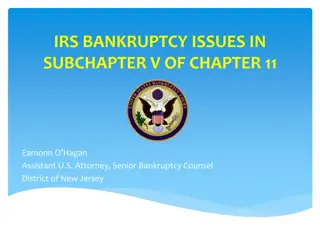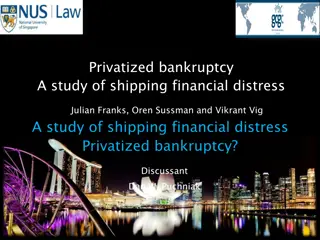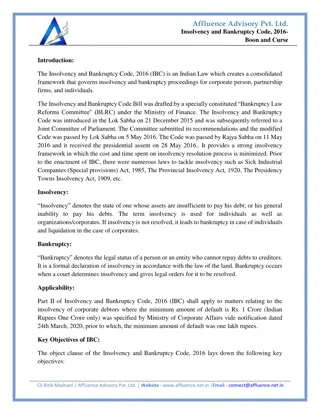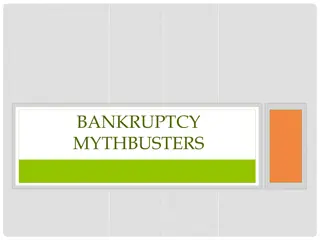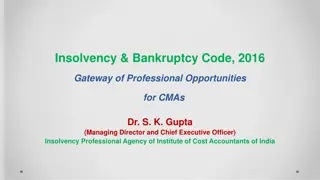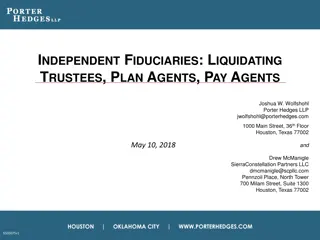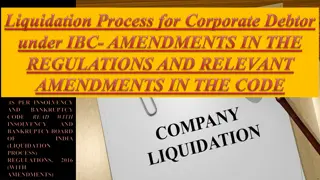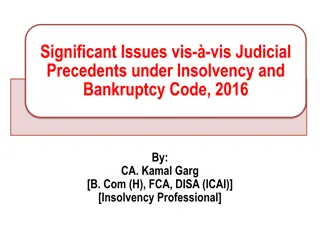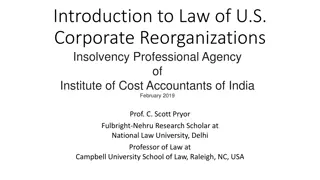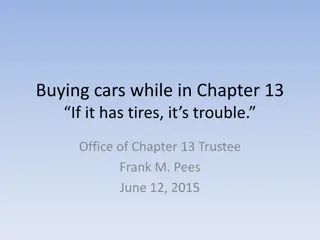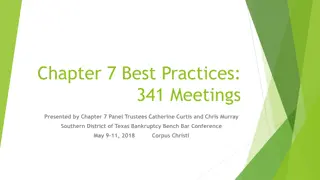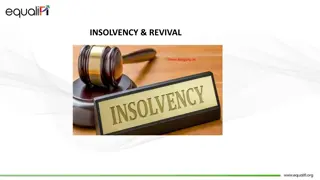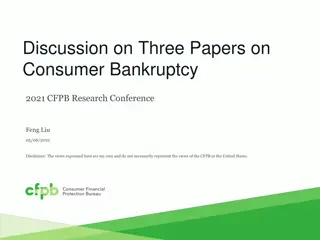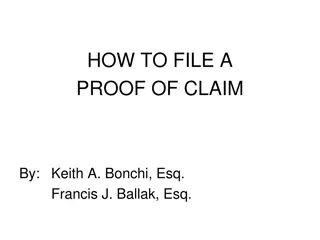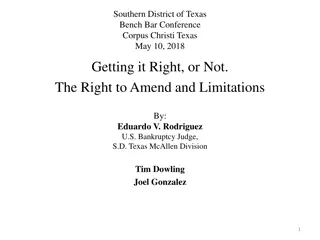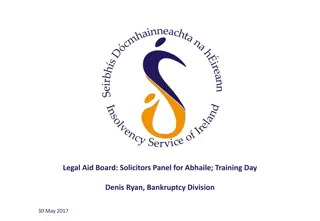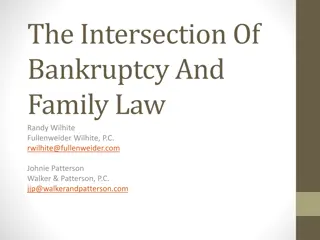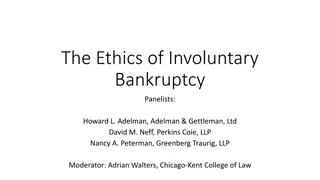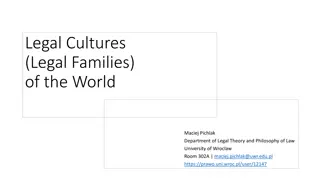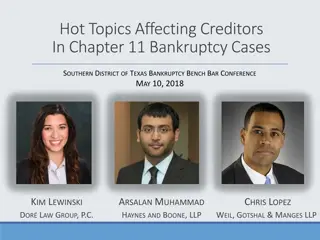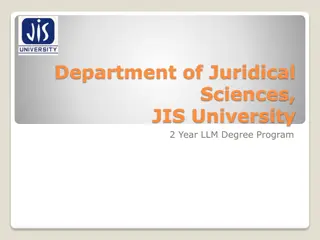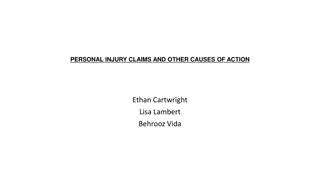Konw about our team
Know About Our Team:\nMr.Bageerathan\nMr. Bageerathan is a distinguished legal professional with a rich background spanning over 16 years in the legal field. He earned his Law degree from University Law College and further enhanced his legal acumen by obtaining Dual Masters degrees in Law (LL.M) fro
0 views • 4 slides
Understanding Claim Objections in Bankruptcy Proceedings
Explore the essential aspects of claim objections in bankruptcy proceedings, covering the burden of proof, forms of objections, and necessary elements in support of objections. Learn about the duties of debtors in objecting to improper claims and the importance of proper declaration in claim objecti
1 views • 12 slides
Bankruptcy Motion Practice Essentials
Dive into the key aspects of bankruptcy motion practice, from contested matters to adversary proceedings. Learn about the rules and guidelines, required documents for motions, and best practices for drafting motions in bankruptcy cases.
0 views • 12 slides
Understanding Third-Party Releases in Chapter 11 Bankruptcy Plans
Chapter 11 bankruptcy plans often include provisions for third-party releases, releasing non-debtor entities from claims held by creditors. These releases can impact various stakeholders, from insiders to affiliates, and involve consent through opt-out mechanisms. In the Third Circuit, such releases
3 views • 8 slides
Liquidation of Companies: Procedures as per IBC 2016
The process of liquidating a company involves collecting and selling its assets to pay off debts, with remaining funds distributed to shareholders. Under the Insolvency and Bankruptcy Code (IBC) 2016, specific procedures must be followed, including initiation by either creditors or debtors within se
0 views • 16 slides
Austin's Theory of Law by Rinkey Sharma: An Overview
Austin's Theory of Law, presented by Rinkey Sharma, delves into the Imperative Theory of Law as proposed by Austin, known as the father of English jurisprudence. It explores General and Particular Jurisprudence, Austin's definition of law, and the elements of positive law, emphasizing the concepts o
0 views • 11 slides
IRS Bankruptcy Issues in Subchapter V of Chapter 11 Explained
This content discusses the IRS bankruptcy issues in Subchapter V of Chapter 11, focusing on tax return filing requirements and payment of post-petition taxes under both standard Chapter 11 and Subchapter V. The responsibilities of debtors, trustees, and governmental units, as well as the compliance
2 views • 7 slides
Privatized Bankruptcy in Shipping: Financial Distress Resolution and Industry Comparisons" (75 characters)
This study explores how financial distress in the shipping industry is managed through private institutional arrangements, minimizing economic costs. It compares unique contractual innovations in shipping to traditional corporate bankruptcy processes, highlighting shipping's outlier status and the e
0 views • 18 slides
Understanding Gas Laws: Boyle's, Charles', Gay-Lussac's, and Avogadro's Laws
Gas laws such as Boyle's Law, Charles' Law, Gay-Lussac's Law, and Avogadro's Law govern the behavior of gases under different conditions. Boyle's Law relates pressure and volume at constant temperature, Charles' Law relates volume and temperature at constant pressure, Gay-Lussac's Law relates pressu
1 views • 19 slides
Insolvency and Bankruptcy Code, 2016- Boon and Curse
The Insolvency and Bankruptcy Code (IBC) 2016 provides a unified framework for resolving insolvency in India, aiming to streamline processes, reduce resolution time, and protect creditors. While it enhances financial stability and transparency, chall
0 views • 4 slides
Evolution of Trust Law in Malta
Malta, with a unique legal system integrating civil and common law concepts, has evolved its trust law over the years. The concept of trust was gradually adopted, culminating in full integration into domestic law post-2004. Recent amendments have further solidified the legal framework, bridging the
4 views • 150 slides
Debunking Bankruptcy Myths: Consumer Insights & Realities
Consumer bankruptcy is defined in the Bankruptcy Code as debt incurred for personal, family, or household purposes, distinct from business debt. This article debunks common myths surrounding bankruptcy, such as its impact on credit, individuals' financial status, and its role in society and the econ
1 views • 14 slides
Understanding the Insolvency and Bankruptcy Code of 2016 in India
The Insolvency and Bankruptcy Code of 2016 in India replaced various existing laws to streamline the process of corporate restructuring, insolvency, and liquidation. Enacted to resolve bad debts efficiently, attract investors, and strengthen the economy, the code offers benefits like quicker resolut
0 views • 31 slides
Comprehensive Guide to Post-Confirmation Trusts and Plan Agents
Learn about the importance and necessity of post-confirmation trusts and plan agents in bankruptcy cases, the selection process for trustees/fiduciaries, choosing the right post-confirmation vehicle, creating trusts through agreements, and understanding the role of litigation/liquidation trusts in m
0 views • 32 slides
United States Attorney's Office, Southern District of Texas - Helping with Bankruptcy Matters
The United States Attorney's Office in the Southern District of Texas, led by Civil Chief Daniel Hu and AUSA Rick Kincheloe, assists with bankruptcy matters, representing the government in such cases. They work alongside other components of the U.S. Department of Justice, such as the Tax Division, t
0 views • 34 slides
Liquidation Process and Costs under Insolvency and Bankruptcy Code
The process of passing a liquidation order under the Insolvency and Bankruptcy Code is detailed, including scenarios for passing the order and the steps involved in the liquidation process. The costs associated with liquidation, as defined under Section 5 and Regulation 2(ea), cover various expenses
0 views • 28 slides
Key Judicial Precedents on Insolvency and Bankruptcy Code, 2016
Key judicial precedents under the Insolvency and Bankruptcy Code, 2016 are discussed, including rulings on insolvency pleas, distribution of profits during Corporate Insolvency Resolution Process (CIRP), obligations of unrelated parties, the 90-day period for filing claims, and the interaction of mo
1 views • 21 slides
Understanding the Rule of Law and Legal Systems in Wales and England
The content discusses the nature of law, the Welsh and English legal systems, and the Rule of Law doctrine. It includes observations from the 2019 AS Law Unit 1 examination, emphasizing the importance of adhering to rubrics and answering questions clearly. Candidates faced challenges with timing and
0 views • 14 slides
Contrasting Legal Systems Around the World
Explore the diverse legal families globally, such as Civil Law (Romano-Germanic) and Common Law (Anglo-American), along with their historical backgrounds, sources of law, and dominant ideologies. Delve into the distinctions between Civil Law and Common Law, their origins, development, and practical
0 views • 17 slides
Understanding General Criminal Law: Principles and Relationships
General Criminal Law encompasses rules governing offenses and their penalties, exploring the definitions of offenses, relationships with social sciences, other branches of law, and auxiliary sciences. This presentation covers the importance, sources, and branches of criminal law, highlighting its in
1 views • 230 slides
Understanding Combined Gas Law and Ideal Gas Law for Final Exam Preparation
Explore the concepts of Combined Gas Law, Boyle's Law, Charles's Law, Gay-Lussac's Law, and their reflection in the Ideal Gas Law. Learn how to solve problems using these laws, prepare for your final exam scheduled for Tuesday, December 12 at 12:30 in the specified room. Dive into in-class practice
1 views • 23 slides
Overview of UK Law: Statute Law, Common Law, Criminal Law, Civil Law
Statute Law is written law created through the parliamentary process, forming the basis of the legal system. Common Law, on the other hand, is unwritten law based on judicial decisions and precedents. They govern different aspects such as civil and criminal matters, each with its unique characterist
0 views • 15 slides
Understanding US Corporate Reorganizations and Insolvency Law
Explore the key players in the US bankruptcy system, including bankruptcy judges, Debtors-in-Possession, and Creditors Committee in Chapter 11. Learn about basic bankruptcy concepts such as claims and priority, and the priority scheme outlined in the Bankruptcy Code. Gain insights into the legal obl
1 views • 13 slides
Guidelines for Purchasing Cars During Chapter 13 Bankruptcy
Understanding the considerations and financial implications when buying a car while in Chapter 13 bankruptcy. Exploring factors such as the need for a new vehicle, budgeting, financing options, and realistic car choices. Emphasizing the importance of reliability over luxury during this financial pha
0 views • 36 slides
Importance of 341 Meetings in Bankruptcy Proceedings
The 341 meeting is crucial in bankruptcy proceedings as debtors must appear under oath to answer questions from the trustee and creditors. Failure to prepare can have serious consequences, and important deadlines stem from this meeting, affecting various aspects of the case.
0 views • 29 slides
International Law Programs 2021: E-Castle Updates and Course Offerings
Explore the online programs offered by the International Law Programs in 2021 at the E-Castle. Discover the benefits, courses available, program dates, instructor insights, and more. From International Business Law to Public International Law, gain valuable knowledge and networking opportunities in
0 views • 21 slides
Understanding the Indian Bankruptcy and Insolvency Code (IBC) of 2016
The Indian Bankruptcy and Insolvency Code (IBC) of 2016 was introduced to streamline the resolution process for companies and individuals, aiming to improve recovery rates and ranking in insolvency matters. It consolidated existing laws, creating a time-bound framework to handle insolvency cases eff
0 views • 19 slides
Analysis of Consumer Bankruptcy Research Papers at 2021 CFPB Conference
Explore insights from three papers on consumer bankruptcy, discussing topics such as racial disparities in bankruptcy outcomes, benefits of mortgage principal cramdown, and the role of judges and trustees. The research delves into moral hazards, shadow debt, and the impact of race/ethnicity on bankr
0 views • 18 slides
The Continuing Relevance of English Law to Irish Corporate Law Reform
English Law remains relevant in Irish corporate law reform, impacting areas like takeover regulation, deferred prosecution agreements, schemes of arrangement, and the comply or explain approach. The influence of English law is seen where there is no EU law dimension or when EU legislation allows mem
0 views • 10 slides
Steps to File a Proof of Claim in Bankruptcy Proceedings
Learn how to file a proof of claim in bankruptcy cases under different chapters such as Chapter 7, 13, and 11. Understand the types of bankruptcy, timing for filing a proof of claim, and how to prepare the claim accurately. Essential information for legal professionals and individuals involved in ba
0 views • 26 slides
Understanding Important Legal Concepts in Bankruptcy Cases
Explore key aspects of bankruptcy law, including time limits for filing supplemental schedules, rescinding reaffirmation agreements, and amending statements of intention. A hypothetical scenario illustrates complexities of cross-collateralized secured claims in Chapter 7 cases. Gain insights from ex
0 views • 56 slides
Classification of Law: Understanding Different Types and Functions
Exploring the classification of law is essential for understanding the diverse nature of legal systems. This overview delves into domestic law vs. public international law, public law vs. private law, and the sub-divisions within public law, such as constitutional, administrative, and criminal law.
0 views • 19 slides
Understanding Bankruptcy Laws and Processes in Ireland
Explore the legal framework surrounding bankruptcy in Ireland, covering the roles of the Official Assignee, consequences of bankruptcy, and the end-to-end process involving debtors, creditors, and the court system. Learn about key laws, regulations, and procedures governing bankruptcy, including ass
0 views • 22 slides
Understanding the Intersection of Bankruptcy and Family Law in Property Identification
Explore the complexities of estate property identification in bankruptcy proceedings and family law, including what is considered as part of the estate, what is excluded, and the determination of property interests under state law. Learn about community property, sole-managed community property, and
0 views • 20 slides
Ethical Considerations in Involuntary Bankruptcy Cases
This content discusses three scenarios involving ethical dilemmas in the context of involuntary bankruptcy filings. From managers filing against fellow LLC members to lenders initiating bankruptcies for strategic reasons, the scenarios highlight complex issues such as creditor solicitation, usury de
0 views • 6 slides
Overview of Legal Systems and Roman Law Development
Legal systems play a crucial role in governing societies, with Roman Law, Common Law, Civil Law, and Religious Law being some of the major types worldwide. Roman Law, focusing on private law, has influenced legal traditions in various regions, especially in Europe. Contrasting Common Law and Civil L
0 views • 26 slides
Comparative Analysis of Legal Families Around the World
Explore the diverse legal cultures and families existing globally, including Civil Law, Common Law, Far East, Islamic, Hindu, and more. Learn about the historical background, methods of reasoning, institutions, sources of law, and dominant ideologies that characterize each legal family. Delve into t
0 views • 17 slides
Understanding Make-Whole Provisions in Chapter 11 Bankruptcy Cases
Make-whole provisions are contractual clauses allowing borrowers to repay debts before maturity, while requiring payment based on future coupon values. This article explores the purpose, definitions, and examples of make-whole provisions in bankruptcy cases, with specific references to relevant lega
0 views • 32 slides
2-Year LLM Degree Program in Juridical Sciences at JIS University
Explore the 2-year LLM degree program offered by the Department of Juridical Sciences at JIS University, specializing in Corporate Law, Criminal Law, and Constitutional Law. The program covers a range of specializations such as Comparative Criminal Law, Human Rights, Corporate Law, Competition Law,
0 views • 7 slides
Duty to Disclose Property of the Estate in Chapter 13 Bankruptcy
Chapter 13 debtors have a legal obligation to disclose all assets, including post-petition causes of action, during bankruptcy proceedings. Failing to disclose such assets can result in detrimental consequences, such as being barred from pursuing claims post-bankruptcy. It is crucial for debtors to
1 views • 15 slides

